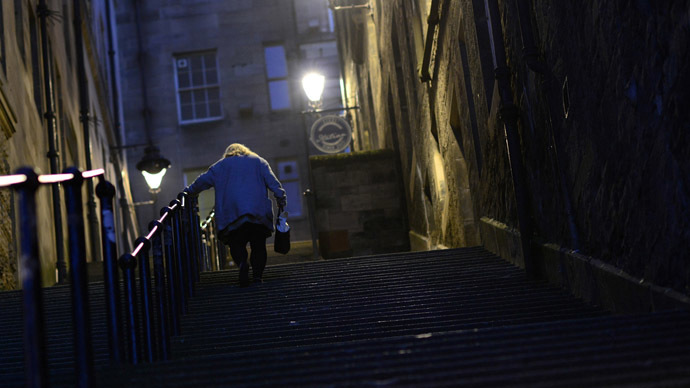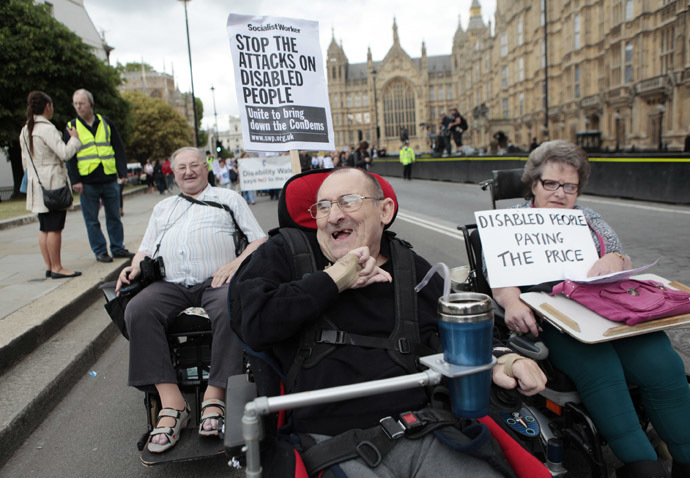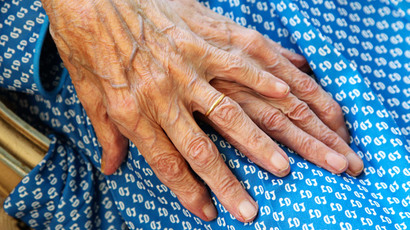Half-blind UK widow commits suicide after incapacity benefit cut

A partially-blind widow, who suffered crippling back pain for over a decade, committed suicide after her incapacity benefit was cut because state assessors claimed she was fit to work.
Following a two-minute assessment, private firm Atos Healthcare concluded Jacqueline Harris was fit to work despite the fact she had trouble walking and suffered constant, excruciating back pain.Her incapacity benefit was subsequently axed by the government, which pays the firm to conduct fitness-for-work assessments.
Harris, a former nurse who had claimed incapacity benefit for a number of years, was awaiting a serious spinal operation when Atos assessed her. According to the deceased’s sister, the Atos employee asked Harris one question during the interview – whether she was capable of catching a bus.
The firm has been the focus of a firestorm of criticism in recent times, with mounting claims that vulnerable and unwell people are being wrongly proposed for work, and are forced to endure exasperating and upsetting medical interviews.
‘Atos should be shot’
Fifty-three-year-old Harris was discovered dead in her home in south Gloucestershire in November 2013, with a hand written note attached to her chest stressing she did not wish to be resuscitated. She took her own life just a few weeks before an appeal hearing had been scheduled with the Department for Work and Pensions (DWP).

Harris’ sister told the Daily Mail the family received a letter about the hearing a month after the former nurse died.
“I didn't tell them she had died and went along myself. I said to them ‘I'm disgusted’. Atos should be shot,” she said.
Speaking outside the Bristol court, where Harris’ inquest was held, Christine Norman said her sister’s decline was sparked by the DWP’s decision to replace her incapacity welfare allowance with Jobseeker’s Allowance.
“It gave her no hope. She was defeated. What hope did she have?” Norman asked.
Norman added the government has since ruled Atos’ decision to declare her sister fit for work was wrong.
Throughout the inquest, the court was told Harris had suffered an array of different injuries and disabilities since the 1990s. Her trouble began with a fall during work, causing injured discs in her neck and back. She also endured chronic pain in her hands, resulting from a vicious dog bite and partial blindness following a severe bang to the head.
As her back pain worsened over time, Harris sought assistance and advice from doctors, attended pain management classes and engaged in physiotherapy.
Following the DWP’s decision that she was fit to work, Harris pleaded with the body saying she was awaiting an intensive back operation. But her poignant pleas were reportedly ignored.

Speaking at her sister’s inquest, Norman said she knew her sister wouldn’t be able to cope with the pain she was forced to endure close to her death. She also sharply criticized the government for failing to offer Harris the assistance she so desperately needed.
Over two million recipients of employment and disability-related welfare are currently having their ability to work assessed by Atos. Current ministers insist it is crucial those who are fit to work have their benefits cut in a bid to force them to seek employment.
Earlier this month, it emerged that the Department for Work and Pensions (DWP) has carried out 60 separate reviews into deaths linked to benefit cuts in the past three years. Shocking cases reveal a spike in suicides and health deterioration resulting from welfare cuts.
In 2013, Amnesty International UK passed a resolution denouncing the government’s assault on sick and disabled Britons’ human rights.
The resolution sought to “halt the abrogation of the human rights of sick and disabled people by the ruling coalition government and its associated corporate contractors.”
Disability specialist Samuel Miller wrote to the office of the prosecutor at the ICC in The Hague in 2012, inquiring as to whether he could file a complaint against Department for Work and Pensions (DWP) ministers for the “draconian welfare reforms and the resultant deaths” of Britain’s “most vulnerable.”
He believed there were grounds for such a case, in light of a request for a Greek austerity trial at The Hague.
Three months ago, Miller asked the UN to open an official investigation into the United Kingdom's benefit-sanctions regime.















